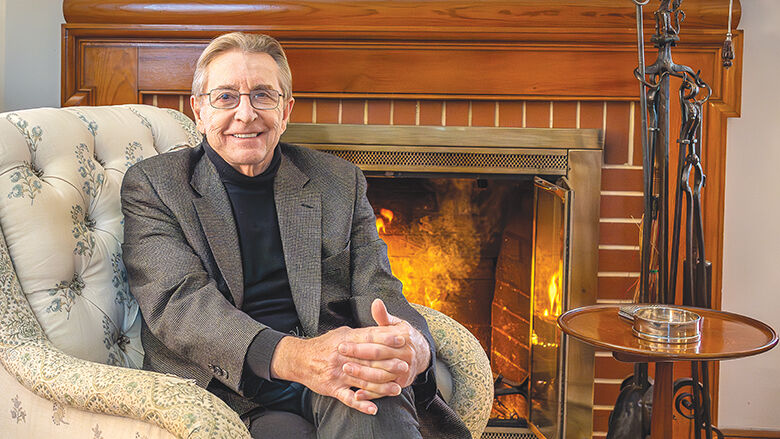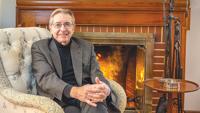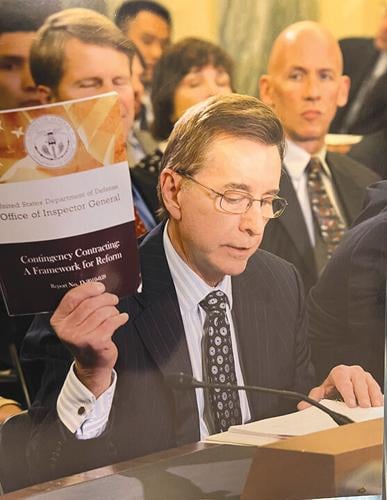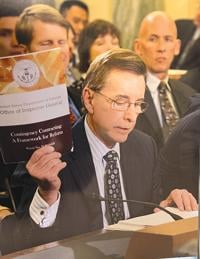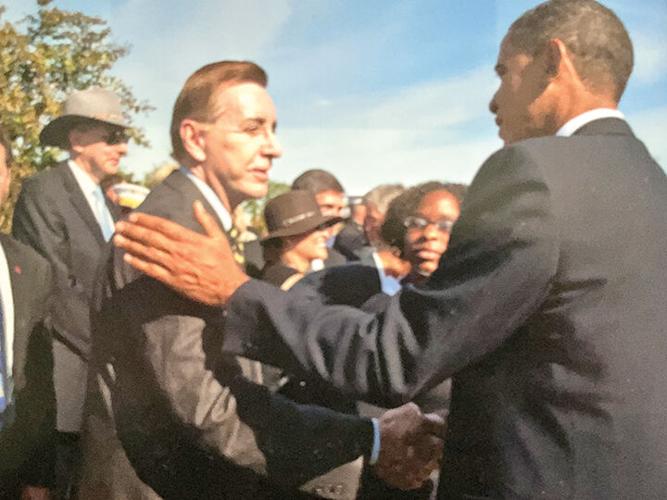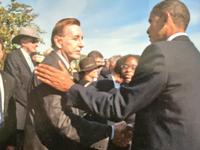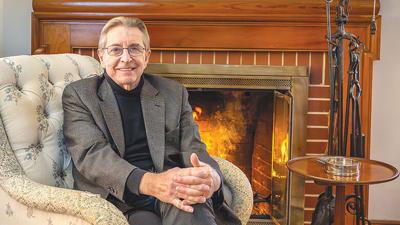Gordon S. Heddell, 81, has moved back to the Twin City area after spending decades in Washington, D.C., working under U.S. presidents Bill Clinton, George W. Bush and Barack Obama.
Growing up, he seemed destined to take over the family’s restaurant business in Crystal City.
His grandparents opened a restaurant in downtown Festus after fleeing Greece during the Greco-Turkish War of 1897.
In 1948, his parents, the late Gordon E. and Angie Heddell, founded Gordon’s Stoplight Drive-In, the well-known burger joint that still operates today at the corner of Bailey Road and Truman Boulevard in Crystal City.
“I’d always imagined that someday I’d step into the family business and continue to serve the people of Jefferson County just the way Mom and Pop had,” said Heddell, a 1961 Festus High School graduate. “But that all changed in 1961 when I heard President John F. Kennedy say in his inaugural address, ‘Ask not what your country can do for you – ask what you can do for your country.’
“Those words just lifted me up. I knew right then that public service was in my future. I wanted to do something important for my country. At the time I didn’t have a clue as to exactly what that would translate into.”
An idea began to crystallize, though, after Friday, Nov. 22, 1963.
Heddell was getting ready to hitchhike home from the University of Missouri in Columbia for Thanksgiving when a friend told him to turn on the TV because Kennedy had been shot.
“The entire country was so moved and emotionally traumatized by this assassination,” Heddell said. “He inspired me, and I thought, ‘I’m going to do something to help prevent that (from happening in the future), and again, I still didn’t know exactly what.”
However, the actions the Secret Service took that awful day caught Heddell’s attention and gave him some more direction.
“One agent in particular had totally captured my interest. I would learn later that his name was Clint Hill. When the shots rang out, Agent Hill sprinted to climb onto the president’s limo, barely getting there, even slipping off the running board once before he was able to grab hold and hoist himself onto the trunk of the car. It was a remarkable example of athleticism. I knew then that was what I was going to do. I was going to become a Secret Service agent.”

Heddell, then-inspector general for the Department of Defense, testifies before a Senate Oversight Committee in 2010.
He said the plan was to get a college degree, serve in the military and earn a law degree. With those credentials, the Secret Service would want him.
Like his father, Heddell was fascinated by aviation and joined the Army in 1966, in the midst of the Vietnam War.
“I heard about this helicopter training program they had, and I joined,” he said. “If I hadn’t done this, I would have been drafted. In fact, I knew I was going to be drafted but that had no bearing. I wanted to fly in the worst way.”
Most of those in his flight school class went directly to Vietnam, and Heddell was disappointed he was shipped to South Korea instead.
“In Korea, I was assigned to a general officer as his pilot,” Heddell said. “Before returning stateside I would do a stint in Taiwan flying for a Chinese general. When I returned home, I was assigned as an instructor pilot at Fort Wolters, Texas, teaching Army, Marine Corps and Vietnamese students how to fly helicopters.”
He was honorably discharged in December 1969 and then finished his bachelor’s degree in political science at the University of Missouri-St. Louis.
He applied for the Secret Service in April 1971.
“They told me they were going to take a look at my background, and I didn’t hear much from them after that for two or three months,” he said. “So my focus went back to law school. I started law school (at Oklahoma City University School of Law) and … the Secret Service called me and said, ‘Hey, are you still interested in the job as special agent?’’’
Heddell quit law school and completed a lot of training the first three years before being assigned in 1975 to protect former Secretary of State Henry Kissinger.
Later, Heddell was assigned to protect Vice President Walter Mondale before a stint in the Foreign Dignitary Protective Division.
In 1989, Heddell was named a deputy assistant director and later became responsible for Vice President Al Gore’s detail. In 1998, Heddell was promoted to assistant director.
From background to foreground
Heddell said he was considering retirement from the demanding job when President Bill Clinton appointed him as inspector general of the Department of Labor.
In that job, Heddell oversaw all the department’s programs and operations and served as a senior adviser to the cabinet adviser in that department.
“I thought this could be boring after the Secret Service,” he said. “Well, what I thought was slow turned out to be a roller coaster, like nothing I’d ever seen.”
Heddell said he oversaw about 200 agents who investigated labor racketeering and organized crime, and in February 2008, the department raided 62 Gambino crime family members. They all were later convicted.
About three months after the raid, President George W. Bush’s administration asked Heddell to be the acting inspector general of the U.S. Department of Defense.
Heddell said he declined at first because he wanted to help wrap up the Gambino case and then retire to spend time with his family, which included a wife and four children.
But, he spoke to then-Secretary of Defense Robert Gates and agreed to fill the job from July 2008 until January of 2009 when the new president would take office and then return to his previous position.
He said President Barack Obama decided to keep Gates, who insisted Heddell stay on.

Heddell talks to then-President Barack Obama prior to Heddell’s retirement in 2012.
“(Gates) said, ‘Listen, I didn’t ask to stay. The future president asked me to stay. Now I would think you could do the same thing.’”
Heddell said his motto always has been if asked to serve, he serves.
At the Department of Defense, Heddell said he advised the Secretary of Defense on matters of department fraud, waste and abuse.
“I was traveling back and forth to Afghanistan and Iraq because one of my biggest jobs was to explain to Congress how the war was going.”
He remembers telling then-Sen. Claire McCaskill that “just about everything that can go wrong is going wrong” in the war.
“And that statement got a fair amount of attention because it was a criticism,” Heddell said. “I’m sure the Defense Department wasn’t happy with me for saying that, but that was what I saw.”
He said being inspector general was his favorite job.
“It was the hardest job I’ve ever had. It was the most exciting, the most demanding, the most challenging job. And you’ve got to remember, when you’re an inspector general, you’re assessing things … It’s about really having a sense of whether we are succeeding or not and going to these places and assessing and then reporting back to Congress and to the secretary.”
He said he learned how the government works and how it doesn’t work.
“You try and learn so much that you can share your knowledge and experience with government officials, congressmen, congresswomen so they can run the government better, so the president can make better decisions, so the cabinet members can make the right decisions when they administer their programs, you know, whether it’s in health care, which was a big thing in the Defense Department, contracting, acquisition of major weapon systems, buying airplanes, building ships, building buildings, fighting wars.”
He said his primary goal was saving the lives of military members. His secondary goal was saving money.
In 2012, he retired and married his second wife, Nancy, in 2013. In the summer of 2013, he briefly returned to the Department of Labor as a chief operating officer until a new inspector general could be confirmed.
Since his retirement, he has written articles for media outlets and done numerous TV interviews about governmental issues. Currently, he is working on a book he hopes to finish in the next six months.
Heddell and his wife, whom he met in grade school, made the decision to move to Crystal City last fall.
“We both thought, ‘Why don’t we go back home?’’’ he said.
Heddell said they are both happy to be home.



